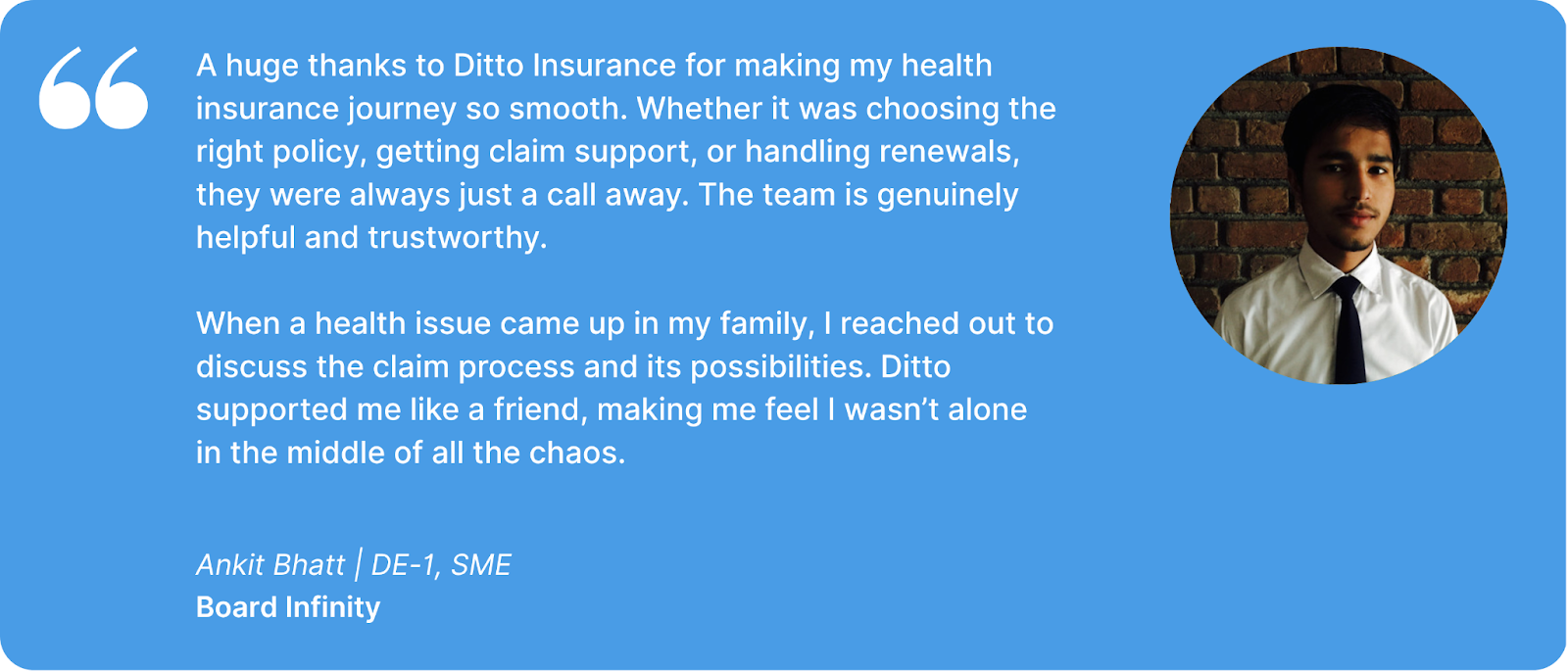What is Short-Term Health Insurance?
Short-term health insurance offers temporary medical coverage for a limited period, usually from 3 months to 12 months. These plans cover basic medical costs for sudden illnesses, accidents, or hospitalization, helping you avoid large medical expenses during gaps in long-term coverage.
During COVID-19, IRDAI defined a short-term health plan as one lasting for less than 12 months. These policies were offered only for COVID treatment with tenures of 3.5, 6.5, or 9.5 months.
Introduction
Wondering if a short-term health plan is enough for your medical needs? These policies are quick and flexible, but their coverage is limited. At Ditto, we help you understand if short-term insurance fits your situation or if a long-term plan suits you better.
This guide helps you understand:
- What short-term health insurance is and its benefits
- What is covered and not in a short-term health plan
- Who should consider buying one
Need help purchasing a health insurance policy? Book a free consultation call with us and our expert advisors will help you out.
What Are the Benefits of Short-Term Health Insurance Plans?
Quick Activation
Affordable Premiums
Flexible Duration
Useful During Gaps
Who Should Purchase Short-Term Health Insurance?
Short-term health insurance suits specific situations and people:
- Job changers: If you have left your job and are waiting for your next employer’s health coverage to start.
- Frequent travelers: Those going abroad or relocating within India for a few months. Plans such as HDFC ERGO Travel Insurance or ICICI Lombard TripSecure+ offer good features at reasonable prices.
- Students or interns: People who need coverage during temporary stays or internships.
- People waiting for long-term plan approval: Some long-term plans take time to issue. A short-term plan fills that waiting gap.

What to Consider When Buying a Short-Term Health Insurance Policy?
Coverage period
Check the duration and whether you can renew it if your situation changes.
Medical coverage limit
Understand how much medical expense the plan covers and what the maximum claim amount is.
Exclusions
Many short-term policies exclude pre-existing diseases or maternity expenses.
Renewal terms
Some plans may not allow renewal after the policy term ends. Make sure you know the conditions.
Cashless network
Choose a plan from an insurer that has a wide hospital network for easy cashless claims.
What Is Covered and Not Covered by Short-Term Health Insurance?
What are the Differences Between Short-Term and Regular Health Insurance Plans?
Ditto’s Take on Short-Term Health Policies
Short-term health plans may seem affordable, but they often skip key benefits like coverage for pre-existing conditions, maternity expenses, or critical illnesses. This means you might save on premiums now, but could face high medical costs later for treatments not covered under the plan.
Travel insurance can help with medical emergencies abroad, but it’s not a substitute for regular health insurance. Moreover, it doesn’t cover planned treatments or ongoing care.
At Ditto, we suggest choosing a long-term comprehensive health plan for continuous protection. Many insurers like HDFC Ergo and Care Health offer discounts on multi-year policies, helping you stay covered without frequent renewals or surprise expenses.
Why Talk to Ditto for Your Health Insurance?
At Ditto, we’ve assisted over 8,00,000 customers with choosing the right insurance policy. Why customers like Ankit below love us:

- No-Spam & No Salesmen
- Rated 4.9/5 on Google Reviews by 15,000+ happy customers
- Backed by Zerodha
- 100% Free Consultation
You can book a FREE consultation. Slots are running out, so make sure you book a call now!
Final Thoughts
India’s health insurance market mainly offers yearly plans that can be renewed for life. These come with benefits like easy portability, policy upgrades, and long-term protection. So, if you are looking for long term benefits, consider comprehensive plans with better coverage instead of short-term health insurance.
FAQs
If I travel abroad, will an India-based short-term plan cover me?
No. These plans usually cover treatment only within India. For overseas care, you’ll need travel insurance or a global health plan.
Can I buy a short-term plan if I already have long-term insurance?
Yes. Many people use it as temporary extra coverage.
Can I convert a short-term plan into a long-term one?
No. You must buy a new long-term plan, and waiting periods start again.
Can I renew a short-term health insurance plan?
Most short-term plans are not renewable. You’ll need to buy a new policy once the current one ends.
Does short-term health insurance cover pre-existing conditions?
No. These plans usually exclude pre-existing illnesses, maternity, and chronic conditions.
Last updated on:










